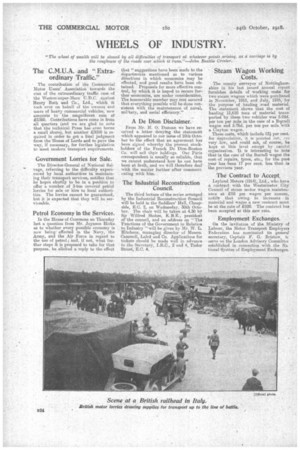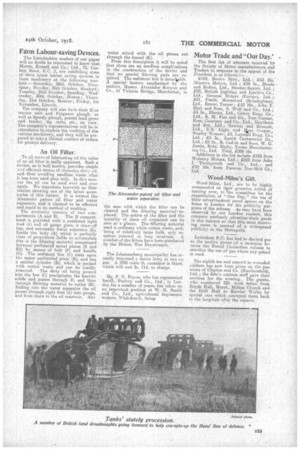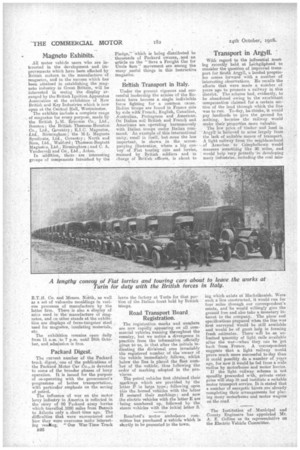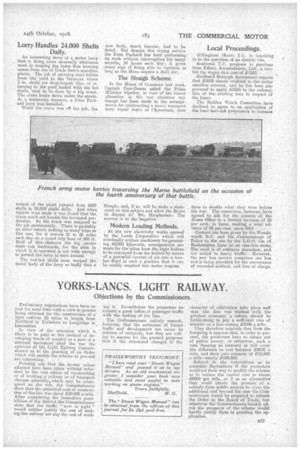WHEELS OF INDUSTRY.
Page 4

Page 5

Page 6

Page 7

If you've noticed an error in this article please click here to report it so we can fix it.
"The wheel of wealth will be slowed by all difficulties of transport at whatever points arising, as a carriage is by the roughness of the roads over which it runs,"—John Beattie Crozier.
The C.M.U.A. and "-Extraordinary Traffic."
• The contribution of the Commercial Motor -Users' Association towards the cost of the extraordinary traffic case -of the Weston-super-Mare U.D.C. agaiust Henry Bute and Cu., ,Ltd., which it took over on behalf of the owners and users of heavy commercial vehicles, now amounts to the magnificent sum of £1350. Contributions have corne in from all quarters (and we are glad to note that the technical Press has even borne a small share), but another £3000 is required in order to get a final judgment from the 'House of Lords and to pave the way, if necessary, for further legislation to meet modern transport requirements.
Government Lorries for Sale.
The Director-General of National Sal
.. vage, referring to the difficulty experienced by local authorities in maintaining their transport services, notifies that he hopes shortly to be in a position to offer a number of 3-ton covered petrol lorries for sale or hire to local authorities. The lorries cannot be guaranteed, but it is expected that they will he serviceable.
Petrol Economy in the Services.
In the House of Commons on Thursday last a question from Mr. Joynson Hicks as to whether every possible economy is now being effected in the Navy, the Army, and the Air Force in regard to the use of petrol; and, ii not, what further steps it is proposed to take for that purpose, he elicited a reply to the effect that "suggestions have been made to the departments mentioned as to various directions in which economies may be effected, and good results have been ohtamed. Proposals for more effective control, by which it is hoped to secure further economies, are under consideration. The honourable member may rest assured that everything possible will he done coneiseent with the maintenance of naval, military, and aerial efficiency."
A De Dion Disclaimer,
From Mr. H. 0. Duncan we have received a letter denying the statement which appeared in our issue of 10th October to the effect that an agreement has been signed whereby the present stockholders of the French De Dion-Bouton ' Co. will sell their holdings. Our Paris correspondent is usually so reliable, that we cannot understand how he can have been at fault, and we will therefore deal with the matter further after communicating with him.
The Industrial Reconstruction Council.
The third lecture of the series arranged by the Industrial Reconstruction eouncil will be held in the Saddlers' Hall, Cheapside, B.C. 2, on Wednesday, 30th October. The chair will be taken at 4.30 by Sir Wilfred Stokes, K.B.E., president of the council, and an address on "The Functions of the Government in Relatimt to Industry "will be given by Mr. W. L. Hitchens, managing director of Messrs. Cammell, Laird and Co. Applications for tickets should be made well in advance to the Secretary, I.R.C., 2 and 4, Tudor Street, KC. 4.
• Steam Wagon Working .Costs.
The county surveyor of Nottinghamshire in his last issued annual report furnishes details of working costs for two steam wagons which were purchased in November, 1915, and July, 1916, for the purpose of hauling road material. The statement shows that the cost of hauling 15,610 tons of material transported by these two vehicles was 5.09d. per ton per mile in the case of a Burrell wagon and 5.76d. per ton per mile with Clayton wagon.
These costs, which inchicle 1.2i per cent. for depreciation, it is pointed out, ?re very low, and could not, of course, be kept at ,lhis level except by careful organizatean. it is interesting to note
• that' in the case of the Burrell wagon the cost of repairs, tyres, etc., for the past year has been 17 per cent, less than ie the previous year.
• The Contract to Accept_
Leyland Motors (1914), Ltd., who have a contract with the Westminster City Council of steam motor wagon maintenance at £55 per wagon per annum, notify that .owing to increases in material and wages a new contract must be at the rate of £100. The contract has been accepted at this new rate.
Employment Exchanges.
On the invitation of the Ministry of Labour, the Motor Transport Employers Federation hes nominated its general secretary, Captain F. G.. Bristow tu serve on the London Advisory Committee established in connection with the Na Hone' System of Employment Exchanges.
Farm Labour-saving Devices.
The Lincolnshire readers of our paper will no doubt be interested to know that , Morris, Russell, and Co.; Ltd., 75, Curtain Road, E.C. 2, are exhibiting some of their latest labour saving devices in farm machinery at the following markets ;—Saturday, 26th October, Grantham; Monday, 28th 'October, Sleeked ; Tuesday, 29th October, Spalding; Wednesday, 30th October, Boston; Thursday, 1st October, Bomme ; Friday, 1st November, Lincoln. The company will also have their Eros tractor unit and Ferguson plough, as well as Speedy plough, patent lama press and trailer, tip carts, etc., On view. The company's representatives will be in attendance to explain the working of the various machinery, and they will be prepared to take a limited number of orders for prompt delivery.
An Oil Filter:
To all users of lubricating oil the value of an oil filter is really apparent. Such a device, as is well known, provides simple irid efficient means of cleansing dirty oil, and -thus avoiding needless waste after it has been used once only. In this manner the oil can le used over and over again. We reproduce herewith an illustration showing one of the latest accessories of this nature. It is termed the Alexander patent oil filter and water separator, and is claimed to be efficient and rapid in its method of working. The accessory consists of two compartments (A and B). The R compartment is provided with 'a combined sight Iced (.1) au d nil gauge glass, adraw-off tap, and automatic water separator (L). Inside the body (A) which is perfectly clear of projections liable to accumulate dirt is the filtering material compressed between' perforated metal plates (E and El) by means of bolt' (F) and handle (G). 'The sediment box (C) rests upon the upper perforated plate (E), and has a oentral cylinder (p), which is packed with cotton waste and can be readily removed. The dirty oil being poured into the box (C) precipitates the heavier solids and passes through D, and then threugh filtering material to outlet (H). Falling into the water separator the oil Passes through sight feed (J) into gauge, and from there to the oil reservoir. Any
water mixed with the oil gasses out through the funnel (K). From this description it will he noted that there are n6 needless comprcationa in the construction. of the. deviee and that no special filtering pads axe required. The sediment box is detaeleble. A. special feature emphasized by the makers, Messrs. Alexander Kenyon and Co., of Victoria Bridge, Manchester, is the ease with which the filter can be cleaned and the filtering material-replaced. The action of the filter and the quantity of clean oil contained can be seen at a glance. The filtering material used is ordinary, white cotton waste, and, being of relatively large hulk, only requires renewal at long intervals. A number of the filters have been purchased by the British War Department.
The Johannesburg municipality has recently imported a motor lorry to run on gas. A 1000 cubic lb. container is fitted, which will cost 2s. lid., to charge.
Mr. F. G. Payne, who has represented Parfrey and Co., Ltd., in London for a number of years, has taken up an important position at W. H. Smith and Co., Ltd., agricultural implement makers, Whitcburch, Salop.
Motor Trade and "Our Day.'
. The first list of amounts received by the Society of Motor manufacturers and Traders in response to the appeal of the President is as follows:— .
2105, Brown 'Bros., Ltd. ; 252 10s; Minerva Motors Ltd.; 226 5s., Honda and Bodies, Ltd., Straker-Squire, Ltd.; 225; British Lighting and Ignition Co., Ltd., General Motors (Europe), Ltd. ; 221, Fredk. Mountiord (Birmingham), Ltd., Ernest Turner ; 210 10e., John T. Hart end Sons, S. Wolf and Co., Ltd. ; 25 5s., Bleriot, Ltd. Cowey Engg. Co., Ltd:, B. M. Fair and Co., Tom Garner, Ross, Courtney and Co., Ltd., Maythorn and Son, •Ltd., Newton and Bennett, Ltd., U.S. Light and ?Seat Corptil., Stanley Watson ; 25, Laystill Engg. Co:, Ltd. ; 23 3s., Zenith Carburettor Co., Ltd.„; 22 2s., R. CacPsh and Sons, W. G. James, Robt. Rigby, Tormo Manufacturing Co., Ltd. Total, 2386 16s. Additions to the list include 2125 from Wolseley Motors, Ltd.; 21e0 from John .Thornycroft and Co., Ltd. ; and 210 10s. • from Parsons Non-Skid Co., Ltd.
Wood-Milne's Gift.
Wood-Milne, Ltd., are to be highly commended on E./fir generOns action of turning over, to the committee for the organization of " Our Day," the use of their advertisedient panel spaces on the buses in London for the publicity purposes of the scheme. As may have been observed by our London readers, this company profusely advertise-their goods in this manner so that this most deserving cause is assured of a widespread publicity in the Metropolis.
Lewisham B.C. has had to discard gas as the motive power of a motorcar because the Petrol Committee refuses to sanction the use of gas where any petrol is used.
The eighth tea and concert to wounded f.oldiers has now been given on the premises of Clayton and Co. (Huddersfield), -Ltd.; the firm's canteen staff gave their services 'for the evening., The guests, who numbered325, were taken from Royds Hall, Marsh, Milton Church.and the Drill Hall to Karrier Works by special cars which conveyed them back to the hospitals after the concert.
Magneto Exhibits.
All motor vehicle users who are interested in the development and improvements which have been effected by British makers in the manufacture of magnetos, and in the success which has been attained in establishing the magneto industry in Great Britain, will bo interested in seeing the display arranged by the British Ignition Apparatus Association at the exhibition of New British and Key Industries which is now open at, the Central Hall, Westminster.
The exhibits include a complete range of magnetos for every purpose, made by
the British Kriccson Co., Ltd., Beestoii; the British Thomson-Houston Co. Ltd., Coventry ; E.I.C. Magnetos, Ltd., Birmingham • the M-L Magneto Syndicate, Ltd., mirky; North and Sons, Ltd., Watford; Themson-Beanett Magnetcs, Ltd., Birmingham; and C. A. Vandervell and Co., Ltd., Acton. .
In addition, there are interesting groups of components furnished by the
B.T.H. Co. and Messrs. Nth, as weil as a set of vulcanite mouldings in various processes of manufacture by the latter firm. There is also a display of mica used in the manufacture of magnetos, and on other stands at the exhibition are displays of ferro-tungsten steel used for magnetos, insulating materials, etc.
The exhibition remains open daily from 11 a.m., to 7 p.m. until 24th October, and admission is free.
Packard Digest.
The current number Of the Packard truck. digest, one of the publications of the Packard Motor Car Co.y,is devoted to some of the broader phases of lorry operation. It is issued for the purpose of co-operating with the government's -programme of better transportation, with particular emphasis on the saving of petrol.
The influence of war on the motor lorry industry in America is reflected in the' story of 90 Packard army lorries which travelled 1000 miles from Detroit to Atlanta only a short time ago. The difficulties that were encountered and how they were overcome make interesting reading. "Our War-Time Truck .i320 Pledge," which is being distributed to thousands of Packard owners, and an -article on the " Save a Freight Car for Uncle Sam" movement are among the many useful things in this instructive magazine.
•
British Transport in Italy.
Under the present vigorous and successful leadership the armies of the Entente have become a single indivisible force fighting for a common cause. Italian troops are found in France side by side with French, English, Canadian, Australian, Portuguese and American. On Italian soil British and French and Americans are operating harmoniously with Italian troops under Italian command. An example of this international unity,. small in itself, but alone the less important, is shown in the accompanying illustration, where a big convoy of Fiat touring care and lorries, manned by British soldiers and in charge of 'BriCsh officers, is about to
leave the factory at Turin for that portion of the Italian front held by British troops.
Road Transport 'Board. Registration.
The registration marks and numbers are now rapidly appearing on all commercial vehicles running throughout the country, but we notice a, divergence in practice from the information officially given to us in that after the initials indicating the divisional area invariable the registered number of the owner of the vehicle immediately follows, whilst below the line is placed the fleet number of the vehicle, thus following the order of marking adopted in the provinces.
The petrol vehicles first obtained their markings which are provided by the letter P in large type; following upon this the horsed vehicles with the letter H secured their markings; and now the electric vehicles with the letter E are being numbered up, followed by the steam vehicles with the initial letter S.
Rom ford's motor ambulance corn. mittee has purchased a vehicle which is shortly to be presented to the town.
Transport in Argyll. '
With regard to the influential meeting recently held at Lcichgilphead to consider the question of improved transport for South Argyll, a landed proprietor comes forward with a number of 'interesting observations, He recalls the efforts that were made a number of years .ago to promote a railway in this district. The scheme had, evidently„ to be abandoned owing to the exorbitant compensation claimed for a certain section of the land through which the line was to run. To-day, he-thinks, it, would ' pay landlords to give the ground for nothing, because the railway, would make their properties more valuable, The low price of timber and land in Argyll is believed to arise largely from the lack of suitable means of transport. A light railway from the neighbourhood of Arrochar to (Nmpbeltown would measure something like SO miles, and would help very potently .in developing many industries,, including the coal nun ing which exists at MaehrihaniSh. Were such a line constructed, it would run for four miles through our -correspondent's estate, and he would willingly give the ground free and also take a monetary interest in the company. The plans and specifications prepared when the line was first surveyed would be still available and would be of great help in forming fresh estimates. There will be an unlimited quantity of light rails available after the war—when they can be got back from France. A correspendent suggests that a light railway would prove -much more successful tu-day than it could possibly do a number of years ago, for now it would be fed from a wine radius by motorbuses and motor lorries. If the light railway scheme is not speedily proceeded with, private enterprise will step in and institute a suitablo motor transport service. It is stated that, a number of energetic hirers are already completing their arrangements for placing many motorbuses and motor wagons
on the road.
The Institution of Municipal and County Engineers has appointed Mr. A. E. Collins as its representative on the Electric Vehicle Committee.
Lorry Handles 24,000 Shells Daily. •
An interesting story • of a, motor lorry that is doing some unusually .strenuous work in keeping the home fires burning comes from one of Uncle Sam's muisition elants. The job of carrying steel billets trom the yard to the furnaces where 3 in. shells are drop-forged, then of returning to the yard loaded with the hot shells, used to be done by a big crane. The crane broke down under the strain. As a temporary measure, a 3-ton Packard lorry was installed..
While the crane was off the job, the outpnt of the plaiit jumped from 6000 shells to 24,OCO shells daily. And when repairs were made it was found that the crane could not, handle the increaied production. So the truck was assigned to the job permanently: There is probably lie other vehicle making as many trips as' this one, for it travels 21 to 28 milee each day on a round trip haul of -500 ft. Half of thiseldistance the big • carrier meat run backwards., for the aisle in which it. is operated is not wide enough to permit the lorry to' turn around.
The red-hot shells soon warped the metal body of the lorry so badly that, a
new body, Imuch heavier, had to be fitted. But despite this trying service the 3-ton Packard has been performing its work without interruption for many months, 24 .hours each day; it gives every sign of being able to continue as long as the Rims require a shell diet-.
The Slough Scheme.
In the House of Commons last week, Captain Carr-Gomm asked the Prime Minister whether, in view of the recent alteration in the war situation any change has been made in the arrangements for constructing a motor transport lorry repair depot at Cippeuham, near Slough; and, if so, will he make a statement on this subject and ellen' the Hoe.e to discuss it? Mr.., Macpherson : The ansWer, is in the hegative.
Modern Loading Methods.
At the new electricity works opened by the :Leeds Ccirporation which will eventually contain machinery for generating 4.000 kil.owatts, arrangements are made for the-ashes from the eight boilers to be conveyed from the boilers by means of a loweeful cm-rent Of air, into a bunker fixed in such a position that it can be readily emptied into motor wagons.
Local Proceedings.
Gillingham (Kent) T.C. is inquiring as to the purchase of an electric van.
Southend T.C. proposes to purchase from Edison Accumulators, Ltd., a twoton tip wagon at a cost of 41242.
Southend Borough Accountant reports that 43820 stands credited to the motor omnibus account, and he has been empowered to apply ..42565 to the redemption of the existing loan in respect of the buses.
The Halifax Watch Committee have declined to agree to an application of the loyal taxi-cab proprietors to increase fares to double what they were before the war. The committee, hoWever, have agreed to ask for the consent Of the Home Office to a further increase of 25 per cent. in fares, making a total advance of 60 per cent. since 1914. .
Consent has been given by the Wandsworth B.C. and the Commissioner of Police to the use by the L.G.O. Co. of Roehampton Lane as an omnibus route. The road is of ordinary macadam, and not suited to heavy traffic. However, the new bus service comprises one hue 'and is being provided for the conveyance of wounded soldiers, and free of charge.






















